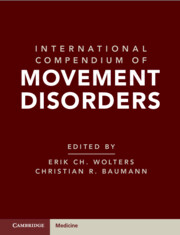Book contents
- International Compendium of Movement Disorders
- International Compendium of Movement Disorders
- Copyright page
- Contents
- Contributors
- International Compendium of Movement Disorders
- Hypo- and Hyperkinetic, Dyscoordinative and Otherwise Inappropriate Motor and Behavioral Movement Disorders
- Section 1: Basic Introduction
- Section 2: Hypokinetic Movement Disorders
- Chapter 12 Autonomic Dysfunction in Parkinson’s Disease
- Chapter 13 Neuropsychiatric Manifestations in Parkinson Disease
- Chapter 14 Sleep–Wake Disorders in Parkinson’s Disease
- Chapter 15 Neuronal Activity in the Basal Ganglia and Thalamus in Patients with Parkinson’s Disease
- Chapter 16 Pathology in Parkinson’s Disease
- Chapter 17 Diagnosis of Parkinson’s Disease
- Chapter 18 Prodromal Manifestations of Parkinson’s Disease
- Chapter 19 Biomarkers in Parkinson’s Disease
- Chapter 20 Physical Rehabilitation of Patients with Parkinson’s Disease
- Chapter 21 Regenerative Strategies for Parkinson’s Disease
- Chapter 22 Conventional Pharmacotherapy in Parkinson’s Disease
- Chapter 23 Continuous Dopaminergic Stimulation in Parkinson’s Disease
- Chapter 24 Pipeline of Pharmacotherapy in Parkinson’s Disease
- Chapter 25 Non-Invasive Brain Stimulation for the Treatment of Parkinson’s Disease
- Chapter 26 Deep Brain Stimulation in Parkinson’s Disease
- Chapter 27 Focused Ultrasound in Parkinson’s Disease
- Chapter 28 Dementia with Lewy Bodies
- Chapter 29 Genetic Parkinsonisms
- Chapter 30 Multiple System Atrophy
- Chapter 31 Progressive Supranuclear Palsy
- Chapter 32 Corticobasal Degeneration and Corticobasal Syndrome
- Chapter 33 Other Tau-Related Parkinsonisms
- Chapter 34 Vascular Parkinsonism
- Chapter 35 Illicit Drug–Induced Parkinsonism
- Section 3: Hyperkinetic Movement Disorders
- Section 4: Dyscoordinative and Otherwise Inappropriate Motor Behaviors
- Section 5: Objectifying Movement Disorders
- Movement Disorders in Vivo: Video Fragments
- Acronyms and Abbreviations
- Index
- References
Chapter 25 - Non-Invasive Brain Stimulation for the Treatment of Parkinson’s Disease
from Section 2: - Hypokinetic Movement Disorders
Published online by Cambridge University Press: 07 January 2025
- International Compendium of Movement Disorders
- International Compendium of Movement Disorders
- Copyright page
- Contents
- Contributors
- International Compendium of Movement Disorders
- Hypo- and Hyperkinetic, Dyscoordinative and Otherwise Inappropriate Motor and Behavioral Movement Disorders
- Section 1: Basic Introduction
- Section 2: Hypokinetic Movement Disorders
- Chapter 12 Autonomic Dysfunction in Parkinson’s Disease
- Chapter 13 Neuropsychiatric Manifestations in Parkinson Disease
- Chapter 14 Sleep–Wake Disorders in Parkinson’s Disease
- Chapter 15 Neuronal Activity in the Basal Ganglia and Thalamus in Patients with Parkinson’s Disease
- Chapter 16 Pathology in Parkinson’s Disease
- Chapter 17 Diagnosis of Parkinson’s Disease
- Chapter 18 Prodromal Manifestations of Parkinson’s Disease
- Chapter 19 Biomarkers in Parkinson’s Disease
- Chapter 20 Physical Rehabilitation of Patients with Parkinson’s Disease
- Chapter 21 Regenerative Strategies for Parkinson’s Disease
- Chapter 22 Conventional Pharmacotherapy in Parkinson’s Disease
- Chapter 23 Continuous Dopaminergic Stimulation in Parkinson’s Disease
- Chapter 24 Pipeline of Pharmacotherapy in Parkinson’s Disease
- Chapter 25 Non-Invasive Brain Stimulation for the Treatment of Parkinson’s Disease
- Chapter 26 Deep Brain Stimulation in Parkinson’s Disease
- Chapter 27 Focused Ultrasound in Parkinson’s Disease
- Chapter 28 Dementia with Lewy Bodies
- Chapter 29 Genetic Parkinsonisms
- Chapter 30 Multiple System Atrophy
- Chapter 31 Progressive Supranuclear Palsy
- Chapter 32 Corticobasal Degeneration and Corticobasal Syndrome
- Chapter 33 Other Tau-Related Parkinsonisms
- Chapter 34 Vascular Parkinsonism
- Chapter 35 Illicit Drug–Induced Parkinsonism
- Section 3: Hyperkinetic Movement Disorders
- Section 4: Dyscoordinative and Otherwise Inappropriate Motor Behaviors
- Section 5: Objectifying Movement Disorders
- Movement Disorders in Vivo: Video Fragments
- Acronyms and Abbreviations
- Index
- References
Summary
Non-invasive brain stimulation (NIBS) is a powerful and typically painless technique to stimulate the human brain. Repetitive transcranial magnetic stimulation (rTMS) and transcranial direct current stimulation (tDCS) with different stimulus modes and parameters are well used patterns of NIBS. Long-term potentiation or long-term depression (LTP and LTD)-like effects can be induced by NIBS. NIBS with practical interventional protocols produces various forms of cortical plasticity and its application has promise for PD treatment. Many clinical trials have shown that rTMS and tDCS with established guidelines are safe, and the interventional protocols using these techniques produce modest therapeutic effects in the patients. Multiple sessions using combinations of different patterns of NIBS and with other therapeutic methods may be more effective for the patient than a single type of intervention. Disease-modifying therapies with long-term effects and development of treatment with benefit beyond conventional therapy in clinical practice using NIBS in PD are theoretically possible and deserve further physiologic studies and clinical trials with large sample size.
Keywords
- Type
- Chapter
- Information
- International Compendium of Movement Disorders , pp. 306 - 315Publisher: Cambridge University PressPrint publication year: 2025

